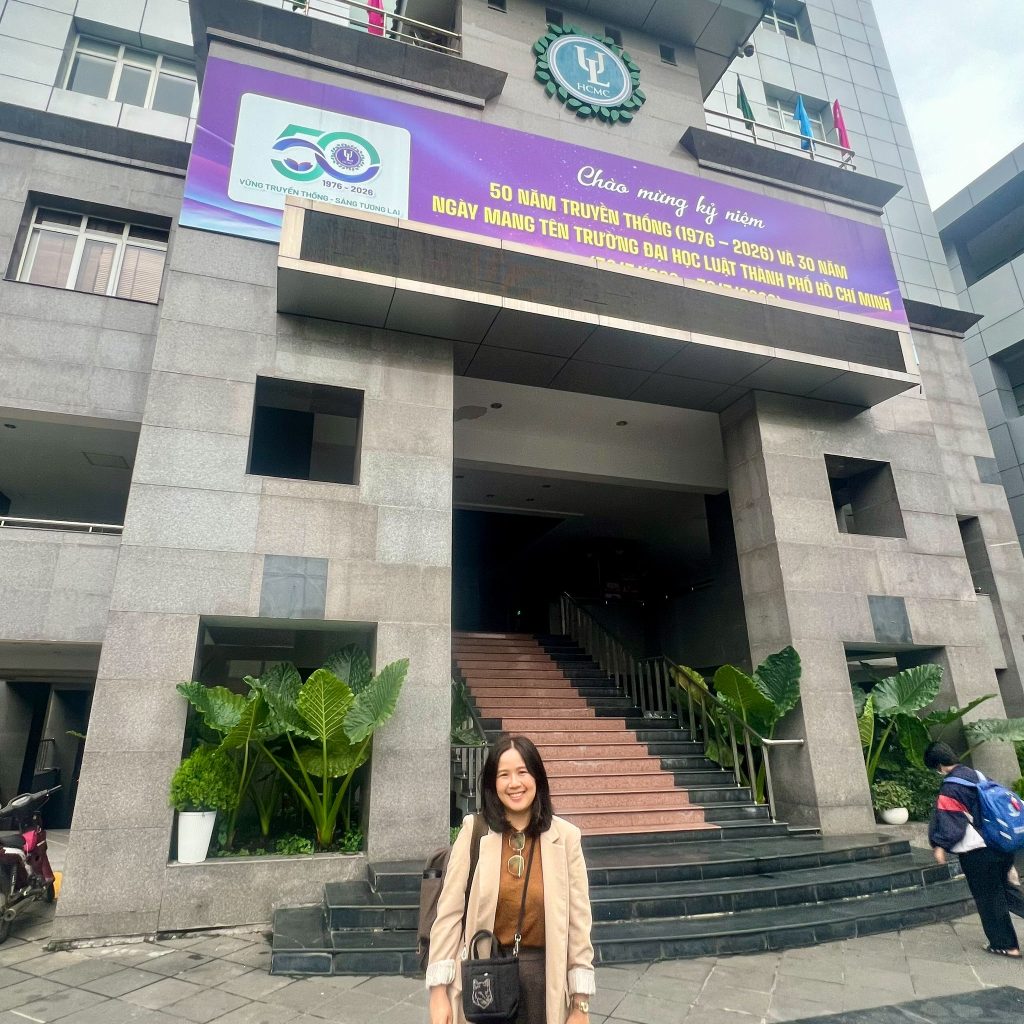คณะนิติศาสตร์ มหาวิทยาลัยเชียงใหม่ มีความมุ่งมั่นที่จะพัฒนางานวิจัยและงานบริการวิชาการให้เป็นที่พึ่งของสังคม โดยมุ่งเน้นการสร้างผลกระทบเชิงบวกต่อเศรษฐกิจ สังคม และสิ่งแวดล้อม ผ่านการวัดและประเมินความสำเร็จด้วยแนวทาง Social Return on Investment (SROI) หรือ Socio Economy Impact
เราตั้งเป้าหมายให้การดำเนินงานด้านงานวิจัยและบริการวิชาการสามารถสร้างมูลค่าผลกระทบ (SROI) ได้ไม่น้อยกว่า 1,000 ล้านบาท ภายในระยะเวลา 4 ปีงบประมาณ (2568-2571) เพื่อสะท้อนถึงคุณค่าของงานวิจัยและบริการวิชาการที่ตอบสนองต่อความต้องการของสังคมอย่างแท้จริง
Social Return on Investment (SROI) คือ?
เครื่องมือที่ใช้ในการวัดและประเมินผลกระทบของกิจกรรมหรือโครงการต่าง ๆ ที่มีต่อเศรษฐกิจ สังคม และสิ่งแวดล้อม โดย SROI จะเปลี่ยนผลลัพธ์ที่จับต้องไม่ได้ เช่น การสร้างคุณภาพชีวิตที่ดีขึ้น หรือการลดปัญหาสังคม ให้กลายเป็นมูลค่าที่สามารถแสดงผลในเชิงตัวเลขได้
ตัวอย่างแนวคิดของ SROI:
-
หากงานวิจัยช่วยลดปัญหาความเหลื่อมล้ำในสังคม ผลกระทบเชิงบวกนี้สามารถประเมินเป็นมูลค่าทางเศรษฐกิจที่ช่วยลดค่าใช้จ่ายของรัฐหรือเพิ่มรายได้ให้กับประชาชน
-
หากบริการวิชาการช่วยพัฒนาคุณภาพชีวิตของชุมชน ก็สามารถประเมินเป็นมูลค่าทางสังคมที่สะท้อนผลลัพธ์ในระยะยาว
SROI จึงเป็นเครื่องมือสำคัญที่ช่วยให้เราเข้าใจถึง “คุณค่าที่แท้จริง” ของงานวิจัยและบริการวิชาการที่มีต่อสังคม
เราจะได้ประโยชน์อะไรจากการใช้ SROI
การนำ SROI มาใช้เป็นแนวทางในการวัดผลกระทบจะช่วยให้คณะนิติศาสตร์ได้รับประโยชน์ในหลายด้าน ดังนี้:
1. สร้างความน่าเชื่อถือและภาพลักษณ์ที่ดี
-
แสดงให้เห็นถึงความรับผิดชอบต่อสังคมและความมุ่งมั่นในการสร้างผลกระทบเชิงบวก
-
ทำให้คณะนิติศาสตร์เป็นที่ยอมรับในระดับประเทศและสากล
2. เพิ่มโอกาสในการระดมทุนและความร่วมมือ
-
ข้อมูลผลกระทบที่ชัดเจนจาก SROI จะช่วยดึงดูดความสนใจจากหน่วยงานภาครัฐ ภาคเอกชน และองค์กรไม่แสวงหาผลกำไรให้เข้ามาร่วมพัฒนางานวิจัยและบริการวิชาการ
3. สนับสนุนการตัดสินใจเชิงกลยุทธ์
-
SROI ช่วยให้คณะสามารถวางแผนและตัดสินใจในโครงการที่สร้างผลกระทบสูงสุดต่อสังคมได้อย่างมีประสิทธิภาพ
4. เพิ่มคุณค่าและความยั่งยืนของงานวิจัยและบริการวิชาการ
-
ทำให้งานวิจัยและบริการวิชาการมีความหมายและตอบสนองต่อความต้องการของสังคมในระยะยาว
บุคลากรมีบทบาทสำคัญในการร่วมมือ
1. ศึกษาและทำความเข้าใจเกี่ยวกับ SROI
-
เข้าร่วมการอบรมหรือกิจกรรมที่เกี่ยวข้องกับ SROI เพื่อให้เข้าใจถึง วิธีการวัดผลกระทบและการประเมินผล
2. บูรณาการ SROI เข้ากับงานวิจัยและบริการวิชาการ
-
วางแผนและออกแบบโครงการวิจัยหรือบริการวิชาการโดยคำนึงถึง ผลกระทบที่สามารถสร้างมูลค่าให้กับสังคม
-
เก็บข้อมูลที่เกี่ยวข้องกับผลลัพธ์ของโครงการเพื่อใช้ในการประเมิน SROI
3. ทำงานร่วมกันเป็นทีม
-
สร้างความร่วมมือระหว่างคณาจารย์ เจ้าหน้าที่ และหน่วยงานภายนอก เพื่อให้การดำเนินงานเป็นไปอย่างมีประสิทธิภาพ
4. ติดตามและรายงานผลอย่างต่อเนื่อง
-
มีการติดตามผลลัพธ์ของโครงการและรายงานความก้าวหน้า อย่างสม่ำเสมอ เพื่อปรับปรุงและพัฒนากระบวนการทำงาน
The Faculty of Law, Chiang Mai University, is committed to developing research and academic services to serve as a refuge for society, focusing on creating positive impacts on the economy, society, and the environment. Success will be measured and evaluated using the Social Return on Investment (SROI) or Socio-Economic Impact approach. We aim for our research and academic service operations to generate an impact value (SROI) of no less than 1 billion baht within a period of four fiscal years (2025-2028) to reflect the value of research and academic services that truly meet the needs of society.
Social Return on Investment (SROI) ?
Tools used to measure and assess the impact of various activities or projects on the economy, society, and the environment. SROI transforms intangible outcomes, such as improved quality of life or reduced social issues, into values that can be expressed numerically.
Examples of SROI concepts:
-
If a research helps reduce social inequality, this positive impact can be evaluated as an economic value that reduces government expenses or increases income for citizens.
-
If academic services help improve the quality of lives in the communities, these can be assessed as a social value that reflects long-term outcomes.
Therefore, SROI is an important tool that helps us understand the “true value” of researches and academic services to society.
What benefits will we gain from using SROI?
The use of SROI as a guideline for measuring impact will benefit the Faculty of Law in several ways, as follows:
1. Build credibility and a positive image
-
It demonstrates social responsibility and a commitment to creating positive impacts
-
It leads to the recognition of the Faculty of Law at both national and international levels.
2. Increase opportunities for fundraising and collaboration
-
Clear impact data from SROI will attract the attention of government agencies, private sectors, and non-profit organizations to collaborate in developing researches and academic services.
3. Support strategic decision-making
-
SROI enables the faculty to plan and make decisions on projects that effectively create the greatest impacts on society .
4. Enhance the value and sustainability of researches and
academic services
-
This ensures that researches and academic services are meaningful and responsive to societal needs in the long term.
Personnel play important roles in collaboration.
1. Study and understand SROI
-
Participate in training or activities related to SROI to understand the methods for measuring impact and evaluation.
2. Integrate SROI into research and academic services
-
Plan and design research projects or academic services with consideration of the impacts that can create value for society.
-
Collect data related to the outcomes of the projects for use in SROI evaluation.
3. Collaborate as a team
-
Foster collaboration among faculty members, staff, and external agencies to ensure effective operations.
4. Continuously monitor and report results
-
Regularly track the outcomes of the projects and report progress consistently to improve and develop work processes.




